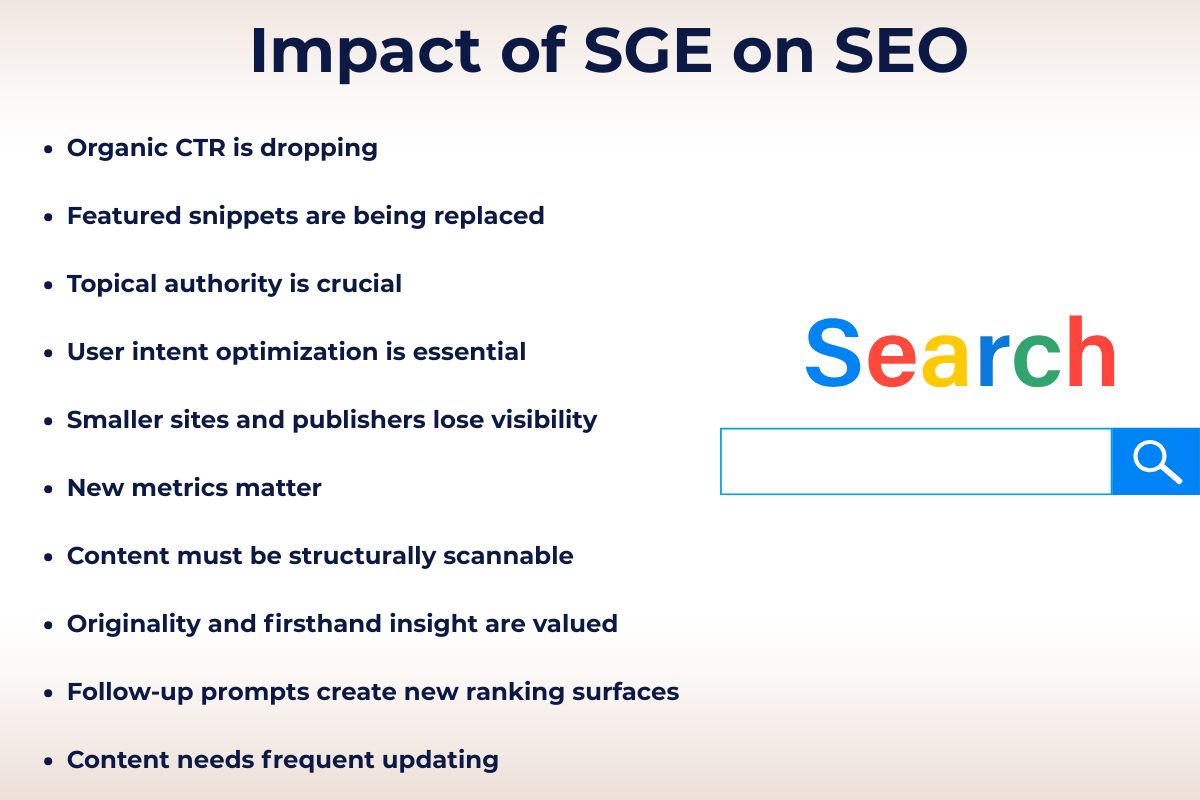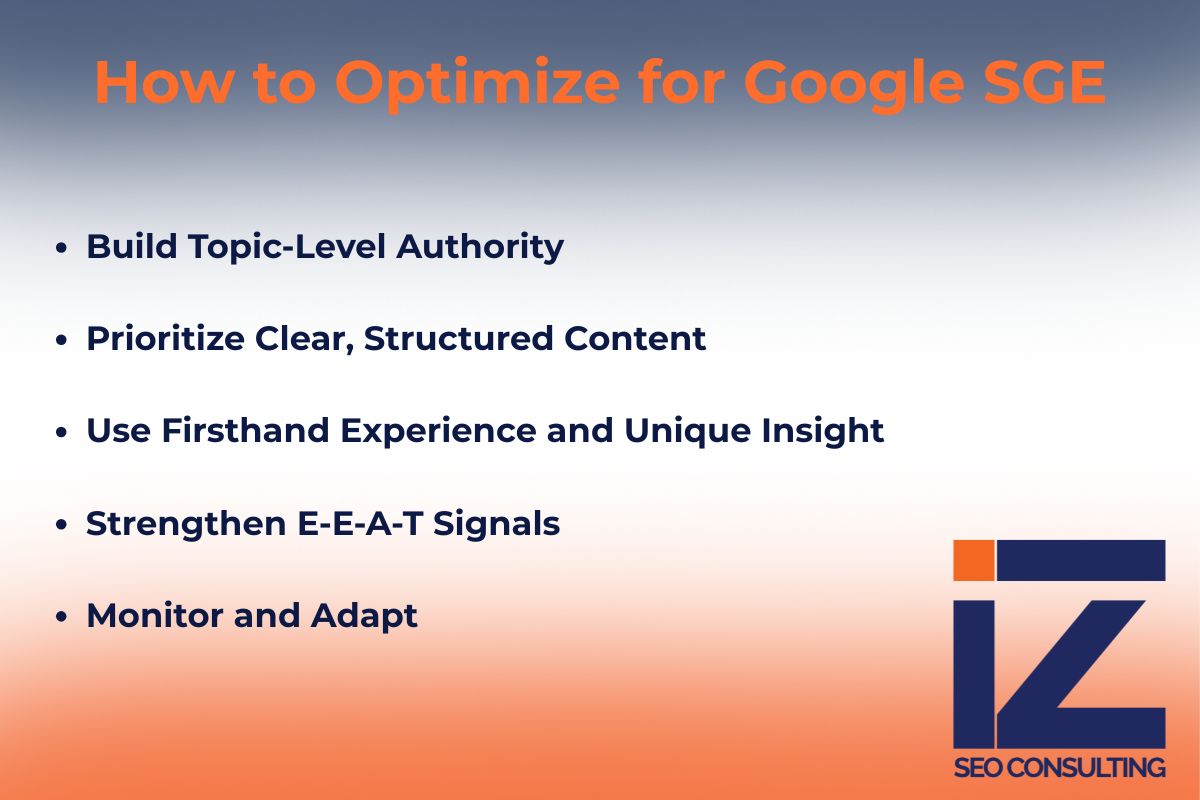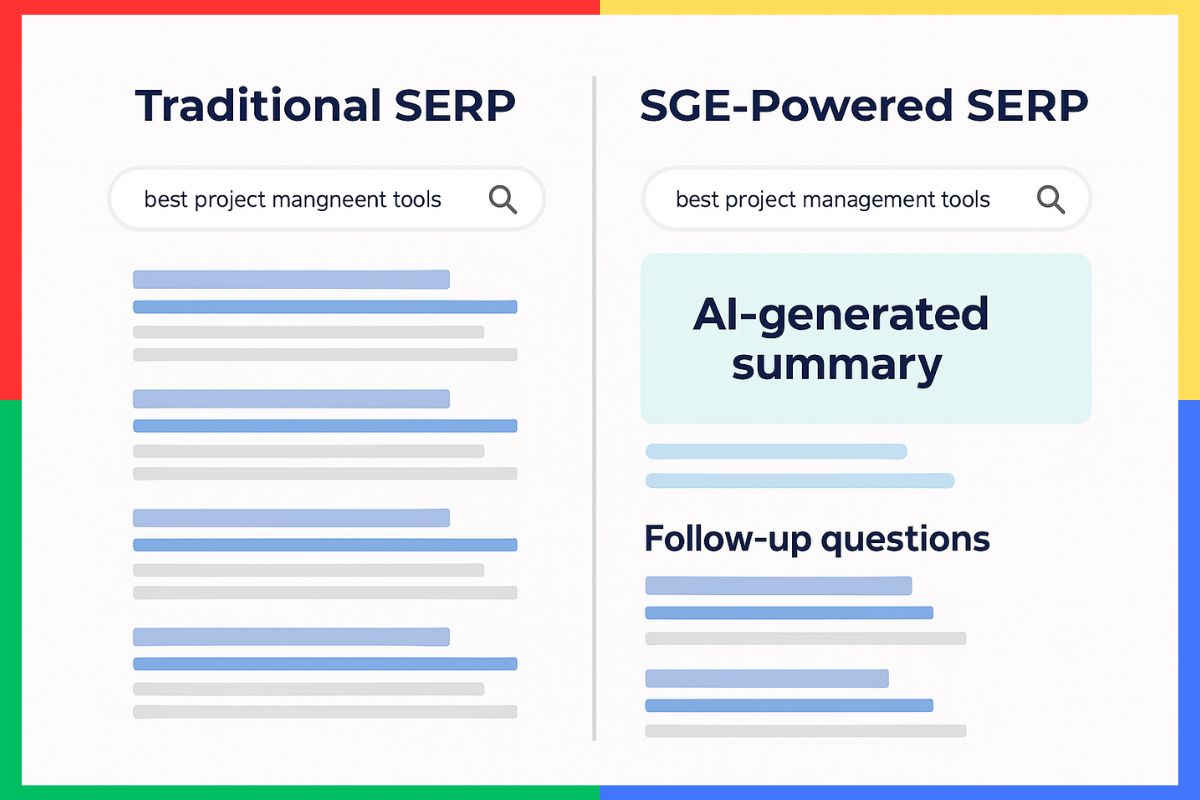Google’s Search Generative Experience (SGE) isn’t just another update you can ignore. It’s completely changing how people find information online. Think of it this way. Instead of Google giving you a list of websites to choose from, it now reads those websites for you and gives you the answer right at the top of the page. Pretty convenient for users, but a big challenge for website owners.
This shift is already affecting how websites get traffic, and it’s happening right now, not in some distant future. The relationship between SGE and SEO has become impossible to ignore. If you own a website or create content online, understanding this change isn’t optional anymore. It’s essential for survival.
What Exactly Is SGE in SEO?
Understanding SGE Meaning and Purpose
Let’s break this down in simple terms. The SGE meaning is straightforward. It stands for Search Generative Experience, which is Google’s fancy name for using artificial intelligence to answer your questions directly on the search page.
Here’s how it used to work. You’d type a question, Google would show you ten blue links, and you’d click around until you found your answer.
Here’s how it works now with SGE. You type that same question, and Google’s AI reads through multiple websites, combines the information, and writes you a summary answer right there at the top. You get what you need without clicking on anything.
So what is SGE in SEO? It’s the new reality that changes how your website gets noticed. Instead of just trying to rank in the top ten results, you now need to get featured in that AI-generated answer box or risk becoming invisible.
Key Features of Google SGE
- AI-generated snapshots that give you quick answers by pulling information from multiple trusted sources
- Follow-up questions that appear automatically, letting you dig deeper without starting a new search
- Source links that usually point to well-established, authoritative websites
- Less clicking required, which sounds great for searchers, but means fewer people actually visit websites
Impact of SGE on SEO
How SGE Will Impact SEO Long-Term
Here’s where things get real. The impact of SGE on SEO is already shaking up the entire industry.
- Fewer people are clicking on websites. When the answer is right there at the top, why would you scroll down? This means less traffic for everyone.
- Featured snippets are becoming outdated. Remember when getting a featured snippet was the holy grail? SGE is replacing those, making the old tricks less valuable.
- Being an expert matters more than ever. SGE prefers websites that consistently demonstrate real knowledge across multiple related topics, not just one-off articles.
- Understanding search intent is critical. The AI focuses on content that truly answers the “why” behind someone’s question, not just the surface-level “what.”

Who’s Getting Hit the Hardest?
- News sites and blogs that depend on lots of page views to make money
- Online stores trying to show up when people search for products
- Local businesses whose listings are getting buried beneath AI answers
A Number That Should Wake You Up
Research from BrightEdge discovered that only 57% of traditional website results show up in SGE answers anymore. That means almost half of the pages that used to get visibility have essentially disappeared from view.
How to Optimize for Google SGE
Playing by the old SEO rules won’t cut it anymore. Here’s how to optimize for Google SGE and keep your website competitive.
1. Build Topic-Level Authority
SGE doesn’t trust random one-off articles. It pulls from websites that cover topics thoroughly and consistently. Think of it like this. Instead of writing one blog post about gardening, create a complete resource with articles about soil types, plant care, seasonal tips, and common problems, all connected and cross-referenced. That’s what Google’s AI looks for.
2. Prioritize Clear, Structured Content
The AI needs to easily understand your content to quote it. That means using clear subheadings (H2, H3 tags) that organize your thoughts, writing in short, digestible paragraphs (like this one), and adding structured data markup when it makes sense.
Think of it like making your content easy for a smart robot to read and summarize.
3. Use Firsthand Experience and Unique Insight
Here’s your advantage. AI can’t make up real experiences or original insights. If you share actual case studies, personal examples, or exclusive data you’ve gathered yourself, you become much more valuable. Generic information that anyone could write? That won’t get you featured.
4. Strengthen E-E-A-T Signals
E-E-A-T stands for Experience, Expertise, Authoritativeness, and Trustworthiness. In plain English, prove you know what you’re talking about. Show your credentials, link to respected sources, back up claims with data, and demonstrate you’ve actually done what you’re discussing. Google’s AI pays close attention to these trust signals.
5. Monitor and Adapt
Keep checking your website’s performance using SEO metrics. Getting visibility in SGE results might require tracking different numbers than you’re used to watching.

One Pro Tip: Optimize for Follow-Up Prompts
This strategy is still flying under the radar, but it’s powerful.
SGE doesn’t just give one answer and stop. It suggests follow-up questions like “What are alternatives?” or “How does this compare to that?” These create whole new opportunities to appear in secondary search results that most people aren’t even thinking about yet.
Here’s how to take advantage. Think about what questions naturally come after your main topic and answer them in your content. Include comparison tables, lists of pros and cons, and alternatives people might consider. Write subheadings as actual questions people would ask.
What Needs to Change in Your Strategy?
The impact of SGE on SEO doesn’t mean SEO is dead. It means it’s evolving. Here’s what needs to change in how you approach it.
1. Stop Writing for Bots, Start Writing for Summaries
AI pulls useful answers, not keyword-stuffed nonsense. Your content needs to deliver real value that’s easy to scan and understand immediately.
2. Focus on Long-Tail, Intent-Rich Queries
Competing for basic keywords like “shoes” is brutal and probably pointless now. Instead, target specific questions like “What’s the SGE impact on SEO for small e-commerce sites?” That’s where the real opportunities are hiding.
3. Refresh Content Frequently
SGE favors current information. Go back and update your most important pages every 6 to 12 months. Fresh content gets priority.
4. Build a Real Brand Online
Brand recognition builds trust with both users and algorithms. When people know your name, you’re more likely to get featured.

Common Pitfalls to Avoid
As you adapt your strategy to work with SGE, it’s just as important to know what NOT to do. Many website owners are making critical mistakes that actually hurt their chances of appearing in AI-generated results. These missteps can waste your time, damage your credibility with Google, and leave you wondering why your competitors are getting featured while you’re not. Here are the most common pitfalls you need to avoid:
- Stuffing keywords. Writing “SGE and SEO” fifty times in weird ways won’t fool Google’s AI. It’s smarter than that. Relevance and natural language win every time.
- Relying too much on AI writing tools. Sure, they can help with rough drafts, but they can’t replace actual strategy and human insight.
- Ignoring mobile experience. SGE interfaces are designed mobile-first. If your website looks terrible or loads slowly on phones, you’re losing visibility before you even start. Also, consider the broader SEO ranking factors that still matter.
FAQ:
SGE stands for Search Generative Experience. It’s Google’s AI-powered feature that creates summary answers to search queries in real time, right at the top of the results page.
It’s the term for how SGE changes search engine optimization, particularly affecting how websites gain visibility and how content strategies need to adapt to this new reality.
How SGE will impact SEO is already visible. It reduces the number of clicks to websites and changes what Google considers “good content,” putting emphasis on clarity, demonstrated authority, and genuine usefulness rather than just keywords.
Focus on writing clearly structured content, building authority across related topics, and putting the user first. Keep your content updated regularly and include real expertise from firsthand experience.
Absolutely not, but it is the end of doing SEO the old way. Smart website owners are adjusting their SEO SGE strategy right now instead of waiting.
Final Take: Adapt or Be Ignored
SGE and SEO are now permanently connected. Whether your website traffic drops or grows depends entirely on how quickly you understand and adapt to this change.
Start by looking at your most important content pages. Are they clear? Well-structured? Do they demonstrate real authority and expertise? Use analytics tools to measure how your rankings are changing and specifically watch for SGE SEO visibility patterns. Build comprehensive topic coverage instead of isolated posts, and shift your entire focus toward creating genuinely helpful, trustworthy, original content that comes from real experience.
If you need expert guidance navigating these changes, Indexed Zone SEO can help you develop a strategy that works in this new landscape.



